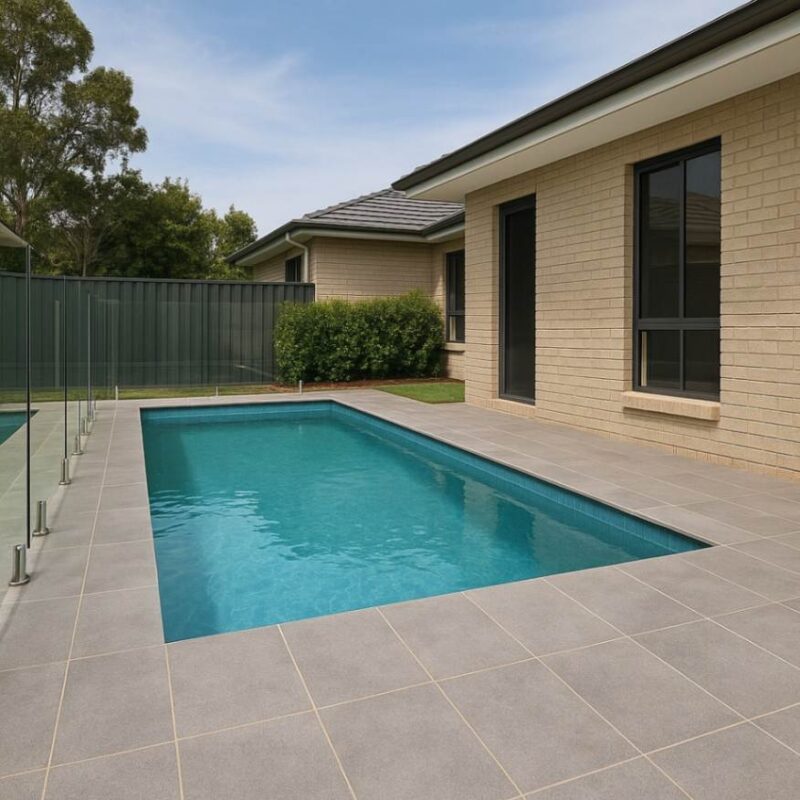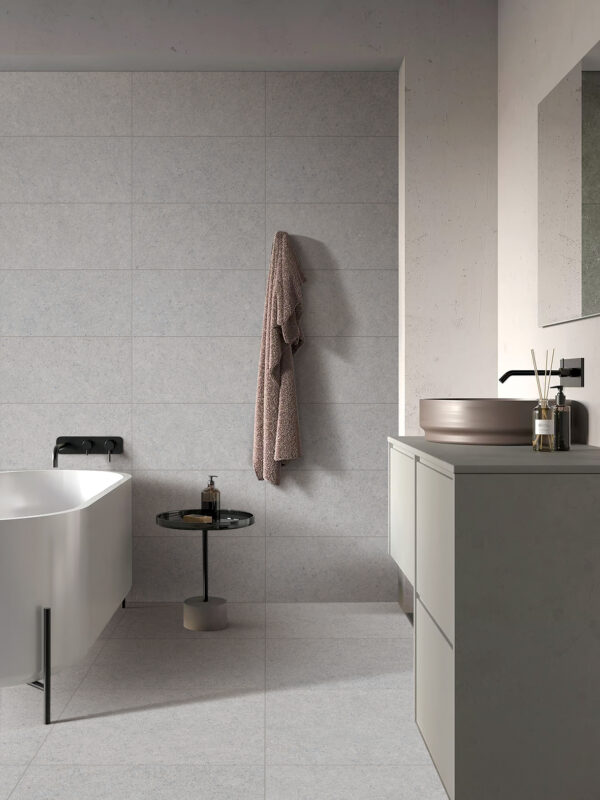Floor tiles FAQ
Picking floor tiles should feel clear and simple. At Go Tiles, we help homeowners, builders and renovators across Brisbane, Underwood and Logan, and we also service Sydney, Melbourne, Rockhampton and Newcastle. This page answers common questions about floor tiles, from ceramic and porcelain to outdoor and travertine. You will also find tips on large formats, non slip options, patterns, grout, costs and care. Use this as a guide, then get in touch for samples, stock checks and delivery times to your suburb.
Your guide to choosing, buying and installing floor tiles
Floor tiles FAQ
What types of floor tiles can I choose from?
Most homes use ceramic, porcelain, natural stone or timber look tiles. Ceramic floor tiles are budget friendly and easy to cut, so they suit simple rooms and walls. Porcelain floor tiles are denser and more water-resistant, so they suit high traffic areas, kitchens and bathrooms. Natural stone, like travertine and marble, gives a one-off look but needs sealing. Timber look floor tiles give you the warmth of wood with the toughness of a tile. If you want a soft finish underfoot, add rugs once the tiling is done.
What is the difference between ceramic and porcelain tiles?
Both are clay tiles fired in a kiln. Porcelain is fired hotter and packed tighter, so it absorbs less water and stands up well in busy rooms. It is a top pick for kitchens, bathrooms, laundries and outdoor areas. Ceramic is easier to cut and often costs less, so it works for lighter traffic zones and walls. If you plan a wet area or want a long-wearing floor, porcelain usually wins. If you want a simple look on a tight budget, ceramic can still do the job.
Are porcelain floor tiles worth the extra cost?
What are travertine tiles and why do people like them?
Travertine is a natural limestone with warm, earthy tones and unique holes and veins. Many people choose travertine for living rooms, patios and pool surrounds. It feels timeless and suits both modern and classic homes. Travertine needs sealing to protect against stains and marks. You can leave small pits open for texture or fill them for a smoother feel. If you love a natural look and you are happy with a little care now and then, tile flooring travertine is a beautiful choice.
What are timber look floor tiles?
Timber look tiles are usually porcelain with a printed wood grain. They give the look of hardwood without warping or fading from water and sun. You can run them from living areas through kitchens and bathrooms for one, consistent look. Planks come in many sizes, so you can lay them in straight lines, herringbone or chevron. If you want the warmth of timber with low care and strong durability, timber look floor tiles tick the box.
What are non slip floor tiles and where should I use them?
Non slip tiles have a textured surface that grips better when wet. They are smart for bathrooms, showers, laundries, entries, ramps and outdoor floor tiles around pools. Look for a slip rating such as R10 to R13 for extra grip. The higher the number, the stronger the texture. In living areas you might prefer a smoother finish for easy cleaning. In wet zones and outdoors, pick a tile that balances grip and cleanability so day-to-day care stays simple.
Can I use floor tiles outdoors?
Yes, if you pick the right tile. Outdoor floor tiles need to handle rain, temperature changes and sun. Porcelain is a strong choice outside because it is dense and low-porous. A textured, non slip finish helps with safety. Natural stone, like travertine, also works outdoors, but seal it and follow care advice. Check the thickness, finish and slip rating. We can suggest options that suit patios, paths and pool areas in Brisbane, Sydney, Melbourne and beyond.

Are large floor tiles a good idea in small rooms?
Are patterned floor tiles still in style?
Are cheap floor tiles a mistake?
No, cheap tiles don’t mean poor quality. At Go Tiles we keep prices low because we import most of our tiles straight from the factory and sell them directly to you at wholesale rates. That way you pay less without losing strength, style or durability. Our tiles are the same quality builders and designers use across Australia, we just cut out the middle steps so you get a better deal.
What tiles work best for kitchens?
What tiles work best for bathrooms and laundries?
Pick non slip porcelain or textured ceramic for floors, and use a grout made for wet areas. Large tiles are easier to clean, but small mosaics give more grip in showers. For walls, ceramic keeps costs down and comes in many shapes. If you love a hotel look, consider a large, light tile on walls and a simple stone-look on the floor. Seal natural stone and keep to gentle cleaners.

Can I lay tiles over existing tiles?
Do I need waterproofing under floor tiles?
How much extra tile should I buy?
You can use our calculator to figure out how much tile you need. Always plan for cuts, waste and future repairs. For straight layouts, add around 10 percent. For herringbone, diagonal or tiles with heavy pattern matching, add 12 to 15 percent. Keep a sealed box or two after the job. If a tile chips years later, you will have a match ready to go.
Are porcelain tiles harder to install?
Yes, a bit. Porcelain is denser and harder to cut, so it needs sharper tools and more time. Large pieces also need careful handling. A skilled tiler will allow for this in the quote. The benefit is a floor that handles heavy use with little wear.
Do floor tiles crack easily?
Do porcelain or ceramic tiles need sealing?
How do I clean floor tiles day to day?
What grout colour should I pick?
Can I use floor tiles on walls too?
Yes. Floor-rated tiles often look great on walls, especially in showers and splashbacks. Just check weight limits if you plan to tile plasterboard. Using one tile on both floor and wall can give a calm, seamless look. Add a feature niche or patterned tile if you want a focal point.
What are the pros and cons of large format tiles?
How do I choose floor tiles for open-plan areas?
What are kitchen floor tiles that hold up to daily use?
What are bathroom floor tiles that give grip and style?
Are outdoor tiles different from indoor tiles?
Yes. Outdoor tiles must handle sun, rain and temperature swings. Pick porcelain with a textured finish or natural stone suited to outdoors. Check slip ratings and thickness. Sealing and drainage matter outdoors, so plan falls and grout carefully. Around pools, choose a finish that stays grippy when wet.
Can floor tiles help with allergies?
Do I need movement joints in tiled floors?
Larger rooms, long runs and areas with sun exposure often need movement joints. These joints allow small shifts without stressing the tiles. Your tiler will follow standards on spacing and placement. Around doorways and where slabs meet, joint planning helps prevent future cracks.
How do I plan quantities so I do not run short?
Why buy from a tile shop instead of a general store?
Do you offer help with design and selection?
Yes. Bring plans, photos and room sizes. We can suggest ceramic floor tiles, porcelain floor tiles, timber look and travertine options that fit your style and budget. We can also talk through patterned floor tiles, large floor tiles and non slip choices for bathrooms and outdoors. Simple, step-by-step advice keeps the project on track.
Do you stock and deliver to my area?
We supply Brisbane, Underwood, Logan, Sydney, Melbourne, Rockhampton and Newcastle, and deliver to many nearby suburbs. Stock moves fast, so contact us for current availability and freight timing. If you prefer, we can arrange pickup. For big projects, we can stage deliveries to match your build schedule.
Can I see examples before I buy?
Yes. You can view samples in store, and for some tiles we can loan samples so you can check colour and texture at home. Light changes tone, so it helps to look at tiles morning and afternoon. If you like two options, lay a few pieces side by side on the floor to compare.
How do I get a quote that covers the full job?
What happens if a tile style goes out of stock?
Can I mix different floor tiles in one home?
What should I know about grout maintenance?
Grout collects dirt first. Vacuum, then mop with a mild cleaner. In showers, a soft brush helps. If grout stains over time, it can be cleaned or re-coloured. Epoxy grout resists marks better in kitchens and entries, though it may cost more at install.
What is the best way to start a tile project with you?
Pick a few looks you like, measure your rooms and note the area use. Visit or contact us with your list and any photos. We will confirm stock, suggest slip ratings and finishes, and plan delivery to Brisbane, Underwood, Logan, Sydney, Melbourne, Rockhampton or Newcastle. From there, you can book a tiler and lock in dates.